Technological changes in my lifetime
Last week, I was at the Web Directions Code conference for work. One of the keynote talks was on “The Evolution of Web Browsers”. And it reminded me how much technology has changed in my lifetime, and how many things I didn’t grow up with which I now take for granted.
So here are some of my experiences with changing technology, both hardware and software. Many will recognise some of these experiences, but the combination is probably unique to me, influenced by when I was born, the family I grew up in, the schools and university I went to, and the places I’ve worked.
What started me thinking was when the speaker mentioned how novel Mosaic was. After all, it rendered websites that had both text and an image.
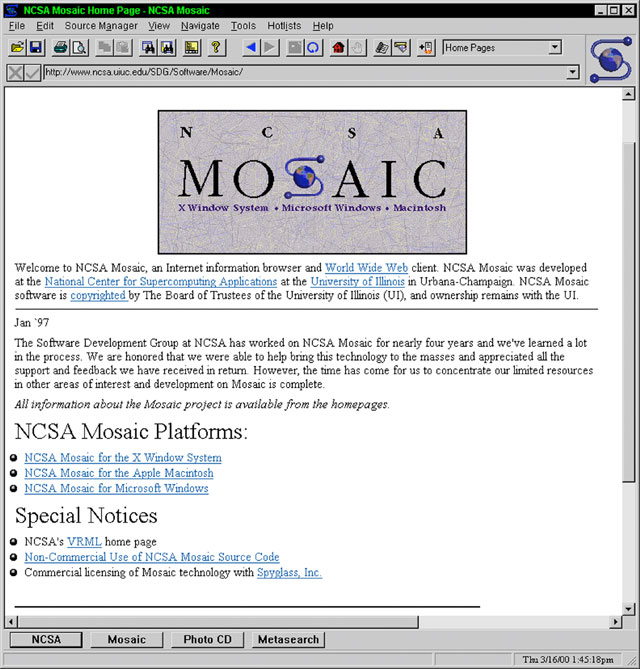
Some people at the conference had used Mosaic. I hadn’t, but the screenshot did remind me of using Netscape Navigator before the days of Google and of Wikipedia.
Primary school
I don’t have any memory of browsing the web while I was in primary school. We had a computer room, with some ancient Macs (far fewer than the number of students in a class). And maybe we did some real work on them, but all I can remember is playing “educational” games.
The one I remember best was Midnight Rescue, which was supposed to teach us English comprehension as we confronted painter robots and discovered clues to the identity of the mastermind before he painted out the school at midnight. Now the graphics and game play seems very simplistic, but with a dash of nostalgia it’s still kind of fun.
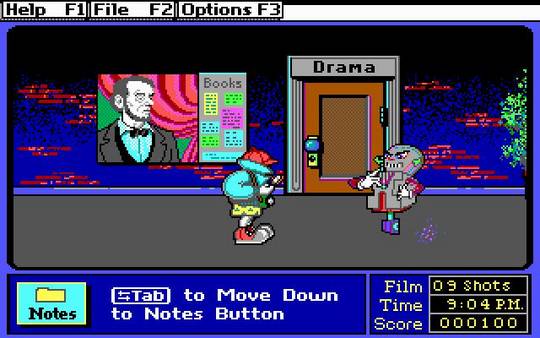
In fourth grade, my family spent a few months in Denver, and the school there seemed ahead of us: There were actually a few computers in each classroom (though I don’t remember whether there was also a separate computer room). We each got some allocated time on one of the computers. And the main thing I remember was another educational game: Number Munchers (which seems to be a DOS game, though I think the computers themselves were running Windows). I particularly remember seeking prime numbers while avoiding the Troggles:
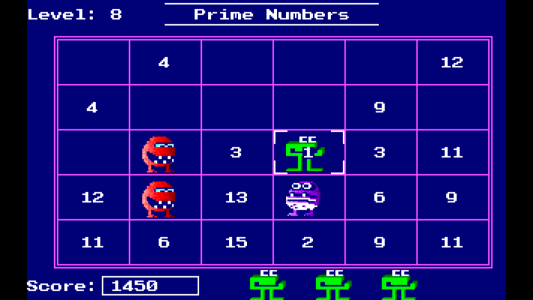
Back in Australia, we were still doing all our computing in the computer room, though before I left the school each classroom had a few computers with allocated computer time.
While we’d been in Denver, we had written weekly letters to various family members back in Melbourne. There was no idea of communicating electronically with people on a different continent. However, once back in Melbourne I had my first encounter with the world of email that now dominates much of my work and personal life.
My memory is that we were told we had to find the email address of someone to write to and then to write an email. My parents suggested writing to the parents of friends from Denver, which I did. But, as far as I can recall, I never received a response. Maybe I got the email address wrong, or maybe they never replied, or maybe the teachers just weren’t good at monitoring the staff email address and passing replies on to students. Anyway, it must have seemed like a black art, and not getting a response probably didn’t do much to help my mental model of what was going on.
Secondary school
In secondary school we also had a computer room. However, unlike in primary school, they were actually trying to teach us real (digital) life skills. We were running Windows NT 4, and were taught about various parts of Microsoft Office, desktop publishing, and even simple database manipulation in Access. It was also when I had my first email address, and probably understood email a lot better now that I was actually sending emails and getting replies.
In secondary school I began using the computer for assignments on other subjects (history, for example). Much of the research was done with traditional media, including random library books (sure to be reliable, right?) and the school library’s copy of Encyclopedia Brittanica. But I also started using electronic resources, in particular Microsoft’s encyclopedia, Encarta (long before the infallible Wikipedia appeared as an ever reliable source). I probably also used other random web pages, which I think I found with Yahoo and AltaVista before Google came to dominate search.
When it came to the assignments itself, I was more interested in content than presentation, and I also lacked access to a colour printer. Some of my teachers felt this was too spartan, so I can remember ruling coloured borders around each page to make it more colourful. I don’t know whether they liked those assignments better, but I think it stopped the complaints…
In school I also used an Apple IIe, which was probably older than me. Why? Years before, our physics teacher had written a program to help teach kinematics, and so year after year students continued to use it.
When it came to file transfer from home to school, there was no easy network access or storage in the cloud. I have vivid memories of using the humble 3.5” floppy disk, including having to compress files over 1.44MB or even split them over multiple disks. Though by the end of my school career I think I might have got a high-capacity USB key (perhaps 16MB?). It may seem small now, but it was a big improvement on using floppy disks.
This was also (I think) before the days of electronic news cannibalising the market share of paper newspapers. In my final year, we were encouraged to take up a special offer to get copies of The Age for a year, which was supposed to help us practice argument analysis for English. And I don’t think anyone was suggesting “Well, just go to The Age website and you’ll get all the news”.
Personal computing
I don’t know exactly when I started to be interested in programming, but I think it was either my last year of primary school or my first year of high school. That and family circumstances led me to many experiences that people my age would not normally have. It all started with buying a few second-hand BASIC books from the micro-computer era, often with complete program listings in the book that you were meant to type in (without making any mistakes!). Looking back now, I can see I didn’t properly understand what was going on, but I was hooked anyway.
After a while I picked up C (possibly guided there by my Dad). And from that point, I think two main factors guided what I was doing:
- Which tools and software my Dad had available (as it happened, mostly Borland C/C++ tools on DOS and Windows).
- The books I could find second-hand or in the library (often fairly dated).
So I’ve used a lot of DOS, including programming with 64K memory segments and the infamous 640K limit. And I think I’ve used Windows 3.11 more than I’ve used Windows 95. But it’s been a long time since I’ve really needed pointer arithmetic.
This experience came in handy when I was given a second-hand Versa V50, a fairly early laptop with a 50MHz 486 processor, 12MB of RAM, and Windows 3.11 with an early version of Microsoft Word. It may have been older than me, though I’m not sure. It probably kept me needing floppy disks - in fact, I think I’ve still got some boxes of floppy disks with the software I used, since it made an interesting link with the past. However, it was handy to have my own word processor for doing assignments, meaning I didn’t need to compete for usage of a family computer.
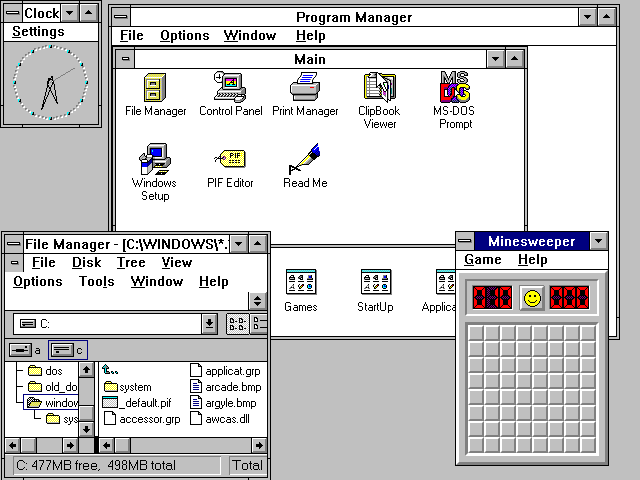
And then I got a brand new laptop, for free. Well, technically for free anyway. Our house was flooded, my laptop had been destroyed, and under the old-for-new policy it was replaced with a brand new machine. I don’t recommend this route for getting new technology, since it meant every book on a bottom shelf had been destroyed, making it very hard to keep track of which books we owned.
The new laptop had Windows XP on. Looking back now, Windows XP feels incredibly dated, and just about no-one wants to have to support it. At the time, though, I remember that it seemed new and shiny and was doing far more amazing things than Windows NT 4 or Windows ME (let alone Windows 3.11…). It even had a wireless internet connection, meaning ready email access, and no more need to transfer files between computers by floppy disk.
One final remembrance of home technology is the distinctive sound of dialing in through a 56K modem, which connected my Dad to his work. On the days he wasn’t working at home we were able to use that work computer. And, of all things to remember, I remember that the first work computer was called yoda, and was later replaced by another called dagobah. I think there must have been a company naming standard of using Star Wars names, though I’m not sure I realised the significance till I watched Star Wars some 15 years later.
Games
I’ve talked about how computers became increasingly useful for real work, but to me as a child and as a teenager their main purpose was playing games. Some of the games I played claimed to be “educational”, and parents and teachers preferred those (though I’m not sure how much they really taught me). Others were just for entertainment.
It wasn’t just computers: Though I never owned a Gameboy or a gaming console, I did sometimes get a chance to play on friends’ Gameboys. However, I was familiar with Mario, because at school we spent lots of time playing the various Mario games on a Nintendo emulator.
At home, I was part of a larger family with concerns about too much “screen time”. There was a shared family computer, and we were typically given 10 minutes each (even for programming spending an hour was a hard-won privilege). For longer games without saving we would often continue the same game, working together or watching other siblings’ 10 minutes (definitely a social time, right?)
Coming from a Christian family, a lot of our games were Christian games. One of my earliest memories is Bible Adventures, where we were able to be Noah collecting animals and food for his ark, Moses’ mother saving him from Pharaoh’s soldiers, or David collecting sheep and ultimately duelling a big, scary Goliath. They weren’t necessarily the best games about - I’ve seen critical reviews online suggesting they were cheap, Christian-themed knock-offs of more popular mainstream games. But for us they were what was there, and they were entertaining enough. And there’s still a certain nostalgia there.
It almost went without saying that first person shooters like Doom weren’t permitted. But there was still a market for that style of game. Enter Super 3D Noah’s Ark:
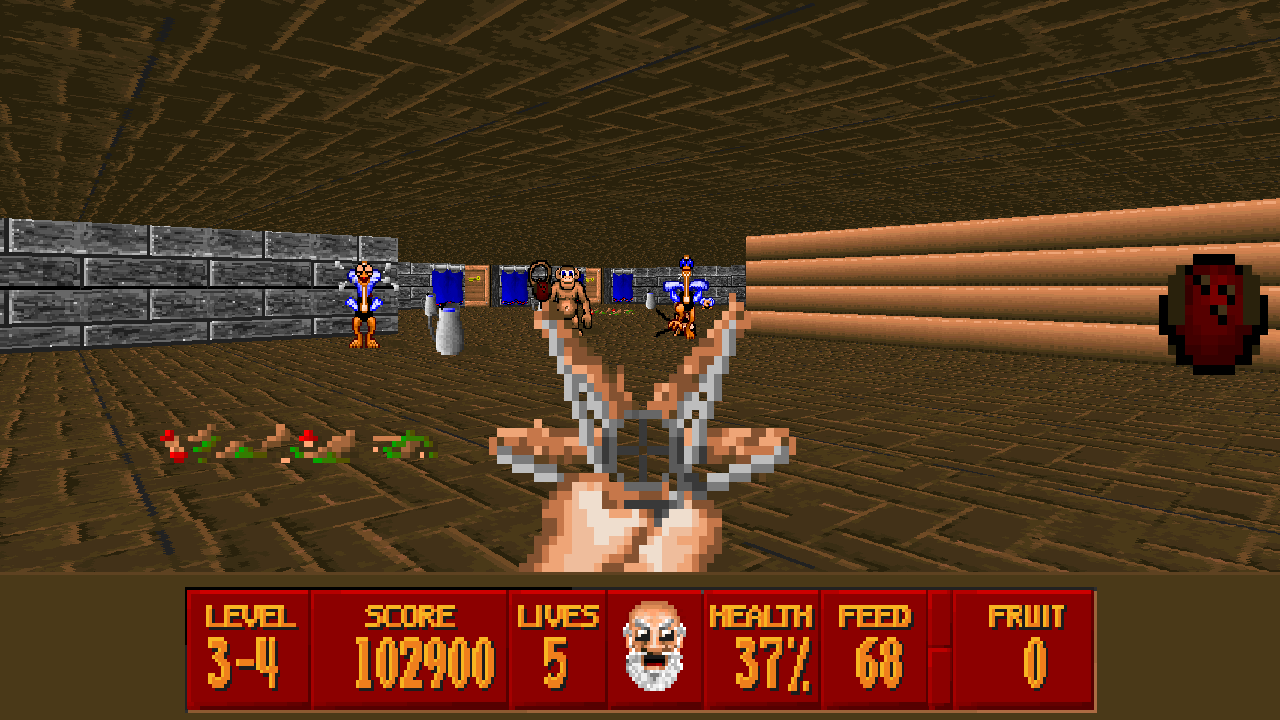
It was based on the Wolfenstein 3D engine, and I’m pretty sure we knew that the original had guns and blood and gore. However, this version was permitted because it was “safe”. In a very Biblical sounding scenario, Noah is trying to quell an animal revolt on the ark (apparently thoughts and prayers hadn’t helped). You could collect different weapons sling-shots and ammunition food, then wander the corridors of the ark encountering Nazis animals and shooting them with food to put them to sleep (the Z-Z-Z type, not the bloody type). Later, I did actually play some of the original Wolfenstein, and the game-play is very similar.
However, we weren’t just limited to Christian games. To me, one of the most memorable games from that DOS era was Cosmo’s Cosmic Adventure (I think Duke Nukem, from the same publisher, was more popular, but I preferred Cosmo - probably partly to a preference for climbing walls and bouncing on enemies rather than shooting them). The game had simple graphics and sound effects (16-color, 320x200 screen resolution, and PC speaker sounds), but it was a lot of fun. The story is that Cosmo has crash-landed on an unknown planet, his parents are missing, and he has to fight his way through hostile alien environments to try and find his parents. We only had the first one, which was shareware, but I had a friend in primary school who lived nearby and had all three. I got a copy of all three some years back and enjoyed playing them (though it may just be nostalgia). And yes, that copy was purchased on the internet and downloaded - no floppy disks turned up at my door.
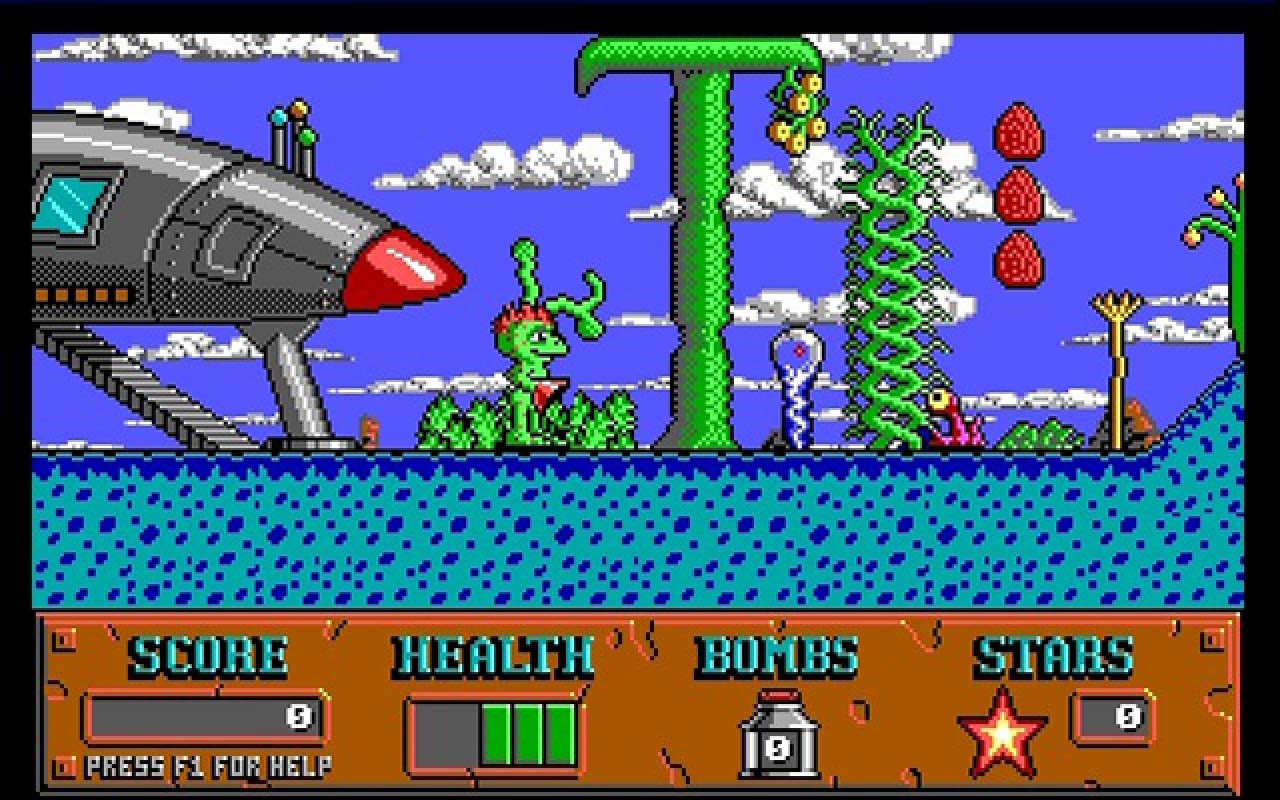
Once we got to the age of the CD-ROM, there were far more games available in the library, and we tried many of them: Simulation games like SimCity and SimTower, flying in SimCopter or in a flight simulator, various Lego-themed games that took forever to load from CD, and I’m not sure what else.
When I had been younger, I had wanted to make my own games, and now I had the chance. For whatever reason, I settled for trying to make a version of Monopoly. When I look at this now, I find the code awful and the UI terrible, but I’m sure it taught me something.
Increasingly, though, I realised that I wasn’t particularly interested in a career in game development. I did do things like playing with ray-tracing code for 3D rendering, but there was a lot of maths involved, and I was probably also put off by the blood and gore I expected to be in real game development (yes, to me back then “real game development” meant 3D, fairly realistic games that were mostly first person shooters. I don’t know if that is actually a good representation of the game development industry).
Today, I probably have the technical ability to replicate most of the DOS games I played, and maybe improve some of them, but don’t have any desire to. As an independent adult I have the freedom to spend as much time on a computer as I want, and yet I hardly ever play games. Somehow, it seems like there’s always something else more important or more interesting to do. I’m sure the child me would be very surprised at that.
University
After school, I studied software engineering at Melbourne University. At the time, the Computer Science department had its own separate infrastructure, running on Solaris, which I used constantly. Most subjects used C and various Unix tools. Since I already knew C, I was able to skip the introductory C subject and do something more interesting: playing with Unix shell scripting and tools. That experience got me hooked on the bash shell, as well as important concepts like version control. Since leaving Uni I’ve mostly used Windows, but I still have a Unix shell available on just about every computer I own or control. For example, the history of this very blog is tracked with Git running in a Unix shell on Windows.
For assignments requiring formatted documents, I came to prefer text formats because they could be better version controlled and allowed better separation between content and presentation. Given some assignments relied on mathematical notation and other specialised formatting, this quickly led me to LaTeX. This blog follows a similar principle, though I use Markdown rather than LaTeX.
The Solaris environment also gave me the chance to use X-Windows, the Mozilla suite (the replacement for Netscape before Firefox became popular), and even the lynx text browser. What’s more, they gave us free print credit every semester, which came in handy sometimes for printing lecture notes and assignments.
I was already interested in computing history, and the department gave me ties back to some of its earliest years. I spent a lot of time in the engineering library reading some of the treasure trove of software development books there, and with the department’s Unix bent we were particularly encouraged to read works from Bell Labs’ pioneering days. The department also had ties back to the early history of computing in Australia, since it had Australia’s first connection to the Internet (linked through Hawaii). In memory of that history we had cs.mu.oz.au email addresses rather than the more standard unimelb.edu.au addresses.
The department even claimed CSIRAC, Australia’s first stored program computer and the fourth in the world, as its first computer. Though they didn’t tend to mention that Melbourne Uni only got it after CSIRO had finished with it. The computer is now held in Museums Victoria’s collection, and was on display at Scienceworks when I was there earlier this year.
During Uni I also worked part-time at a company maintaining an 80x25 character-based application developed with a dBase derivative running on Linux. It was also while working for that company that I fell in love with Python, and encouraged them to begin a rewrite in Python with a PyQt interface (unfortunately, it hadn’t got far when I finished Uni and quit, so I don’t know how well it succeeded).
One final technological influence I remember from that period was Gmail. Even before I’d gone to Uni, I’d read a lot about HTML, mostly from older books talking about cgi-bin and DHTML. However, applications on the web usually seemed slower and clunkier when compared with native applications. Yes, DHTML allowed us to manipulate the page without a round-trip to the server, but most of the examples I saw were toy examples, so I didn’t really understand how much this technology could improve the UI.
Gmail was different. I joined it while it was still invitation-only, and even then it had a better UI than the native applications I was using to read emails, as well as letting me access my emails from any computer without having to install software. Gmail Chat was also the first time I used instant messaging, and I still use it to keep in touch with some of my siblings.
I’m sure it was an influence on my third and fourth year team projects. The third year one was a conventional web app built on a (pre-1.0) Django, but one of my team-mates styled it so it was a pleasure to use (and it also led to my favourite presentation). I wrote most of the frontend for my fourth year project, and decided to emphasise both responsiveness and styling. I relied heavily on jQuery, jQuery UI, and AJAX, and I think I even used functionality like drag and drop just to show that I could (not sure I’ve used it on the web since…)
Forward to today
Since leaving Uni, I’ve mostly stayed with Windows on the desktop. At work I’ve gone from Windows XP to Windows 7 to Windows 10. At home I’ve gone through several laptops, jumping from my flood replacement XP laptop to a Vista laptop, then my current one started with 8.1 and I upgraded it to 10 once it seemed stable. At work I mostly deal with Delphi, Java, and Javascript, while at home my main extra-curricular language has been Python.
I still use and like Gmail, though I do increasingly worry about the control Google has over the web ecosystem. Right now, it tells me that I have over 77,500 conversations. Many of those will be automatically generated emails, and some will be chats and drafts. But some of them are going to be email chains with 50 or 100 emails in, possibly with hours of thought per email. I’ve been on mailing lists with participants from many different countries. I don’t think my primary school self could even have comprehended how important email would become to me.
I’ve never considered myself at the cutting edge of technology, but it is instructive looking back how many things which once seemed an unnecessary luxury have become indispensable. Mobile phones are a good example: I never wanted to have one, and am still not completely sold on the idea that someone can contact me at any time they like. As a result, when I was applying for graduate jobs in my final year, anything which couldn’t be done over email required me to find a pay-phone at Uni to make a call.
Smart-phones seemed like they would be more of the same - an expensive and over-complicated phone. But what they have ended up is powerful, general purpose computers. I mentioned CSIRAC before, and the museum display compares it with an iPhone 8: It was 2,500 tonnes, not 148g, and yet it only had 2 KB storage capacity and 1 kHz CPU speed, while the iPhone has a 2.3 GHz processor and can have 256 GB storage. And yet the museum claims CSIRAC was revolutionary because it could do calculations 1,000 times faster than previous methods. How times change.
I now carry my phone everywhere, using it as a clock, an alarm, a map (particularly while hiking), a torch, an audiobook player, and probably a bunch of other things. Occasionally I even use it for a phone call or text message…
I’ve never owned a tablet, and still prefer to do most “serious” tasks on my desktop rather than my phone (it has a bigger screen and feels easier to multi-task). And I still don’t tend to whip out my phone to answer any question coming up. But maybe I’m already in the minority - one of the speakers at the conference said 2016 was the tipping point when more than half of internet usage was tablet or mobile rather than desktop.
Technology has also crept into other parts of my life. For example, the way I read has changed: I have bookshelves filled with books, and five years ago they would have been the main thing I read. Then I got a Kindle Paperwhite before travelling overseas, feeling it would be easier and lighter to carry one Kindle rather than multiple books. However, that same convenience applies here in Melbourne: Particularly when travelling on a train to and from work, most of my reading is done on that Kindle. And through the Amazon store I have access to a vast number of books, and can buy new ones with just a single click. As a lover of the classics, many of the paper books I own are public domain. However, now I am much more likely to get these books from the Project Gutenberg library, or to listen to the Librivox audiobook on my phone. Even if I want access to paper books, I can much more easily transfer books between library branches online. What this means is that I have much less need to actually own paper books, especially public domain ones, though as it turns out I continue to collect them. Outside of books, any news that I read is likely to be read online rather than in a physical newspaper, and much of my reading online would be of blogs and similar that just weren’t available when I was young.
When I grew up, we didn’t have a TV, and only rarely went to the movies. However, once computers started to have DVD players, movies and documentaries started to come to us. Then came online streaming of video: At first, it was limited by both internet speed and download limits, but now it’s pretty much expected. I don’t at present subscribe to Netflix, Amazon Prime, or any similar service - but I do watch YouTube for all sorts of things: Music, sketch comedy, relevant clips of movies, cricket or tennis highlights, even the occasional TED Talk. And I can watch any of them at any time.
Photography also ends up taking a lot of my time, particularly when hiking or sight-seeing. I used to have an old film camera, which was relatively expensive per picture. It also cut out the rapid feedback loop, since I couldn’t see the pictures I’d taken until after I’d finished the roll of film and had it developed, by which time I would have forgotten what I was trying to do with any particular picture. Now, I have a digital camera on which I can and do take hundreds of pictures in a day, which allows me to experiment with different options for taking a picture and compare them, and which allows me to share those pictures with people all round the world.
One final effect for me of this technological change is a change in the nature of community. Up until the end of high school, I’m not sure I knew anyone that I hadn’t actually met in Real Life. Now, I have a number of friends, some close friends, that I have never met, and belong to a number of online communities with members from cities and even countries where I’ve never been.
Fast and free
Consider some of the things I’ve mentioned: Wikipedia, YouTube, Project Gutenberg, Librivox, news sites, blogs, podcasts, even sending emails internationally. None of these things were available in my youth. The equivalents to these things had to be paid for, and typically had a physical form: encyclopedias, newspapers, books, cassettes and video tapes, letters. Maybe some of them could be borrowed from libraries rather than bought, but they still had a physical form, and still had to be specifically produced and acquired.
In contrast, much of what is available today is online and free. These things don’t have a physical form, and thus obtaining a copy has almost zero marginal cost. Here in the southern hemisphere, we’ve been used to longer shipping times, lower product availability, and higher prices. But with digital products there is less need for this to be the case. Even remote areas can have access - for example, I last wrote about the wonder of technology after seeing someone take a photo on a remote peak and immediately share it with their family.
As well as geographical availability, this also affects the speed of access: We no longer need to plan ahead to borrow or buy a resource, or to wait for a letter to be delivered. Both information access and communication can be almost instantaneous. Even if the resources are paid for, we are able to pay online and then access them immediately.
Increasingly, the bottleneck is not access to information or entertainment, but the time available. This was probably already true when I was young, but now it is quite clear there is no chance for me to read every book on Gutenberg, pursue every topic of interest on Wikipedia, or watch all of YouTube.
Unfortunately, as another of our conference speakers pointed out, this has a downside: “Free” resources are often supported by ads, meaning our attention is a valuable commodity and services like YouTube compete to try and keep us hooked. It has also meant increasing mining of our personal information with a resultant loss of privacy. Maybe in a world where information is far more abundant than our time, we should value our time and attention more than our money?
I think more rapid communication also divides our attention much more: It might be convenient for us to be able to get answers from others quickly, but it comes with higher expectations of how often we check for and respond to communications from others. When I first started work, I didn’t check my personal email at all during the day. Then I only checked it at lunch-time. Now I still try to control my usage, but it’s much more likely that I check it multiple times a day in case there’s something I need to respond to. I feel it has led to a world with many more possibilities, but where it can be much more difficult to actually focus on the possibilities you choose.
I’m also not sure what all this does for the idea of ownership. I still own piles of DVDs and shelves of books, and still feel like that’s important somehow. And yet I’m sure that many of them I’ve never watched or read, while others I will almost certainly only watch once. I’ve probably loaned a few of them to family and friends, but not enough to justify owning them. In the presence of streaming services, it’s not clear what I gain from owning them over having access to a much larger library for a monthly fee. And as for the free resources, I don’t need to “own” Gutenberg or Wikipedia - just ensure that I continue to have access to them.
Young people today
I’m not particularly old, but sometimes the march of technology makes me feel old. Many of the things I described above are different from what I grew up with, and yet younger people just take them for granted because they don’t know anything else. I’m sure the same is true of those in my parents’ generation: I take things for granted that they have seen change in their lifetime. I think Douglas Adams described it well:
I’ve come up with a set of rules that describe our reactions to technologies:
- Anything that is in the world when youre born is normal and ordinary and is just a natural part of the way the world works.
- Anything that’s invented between when youre fifteen and thirty-five is new and exciting and revolutionary and you can probably get a career in it.
- Anything invented after you’re thirty-five is against the natural order of things.
For example, I remember the difficulty teaching younger siblings how to use a mouse (it’s a fairly simple mental mapping, but surprisingly difficult to learn). Touch interfaces have changed this: Now, I see toddlers who seem able to pick up any phone or tablet and just start using it.
When I was in school, we did not routinely have access to either computers or phones. They were housed in a separate “computer room” which we occasionally had access to. And yet now it seems many schools require all students to carry laptops or tablets which can be used in any class, and which significantly changes the way things are taught. Recently, the Victorian state government banned mobile phones in state schools from 2020. This was a controversial decision, and yet it is exactly the state of education when I was in school. Even when I was in Uni studying software development few students carried laptops with them, whereas now I understand that it’s pretty much expected for all Uni students.
Can the modern youth imagine a world without these things?
Conclusion
There’s so much more I could write, but that should give a feel for how technology has changed over my lifetime. I find the changes themselves interesting, but I also find it interesting how technological novelties have become essentials and changed the way I interact with the world around me.
On balance I’d like to think the changes are improvements, though sometimes the consequences make me feel uncomfortable. I’m also not sure how well I’m keeping up with technological change - there are plenty of technologies that seem normal to those around me that I haven’t quite “got” yet. However, I will be interested to see where technological changes take us in the coming years.